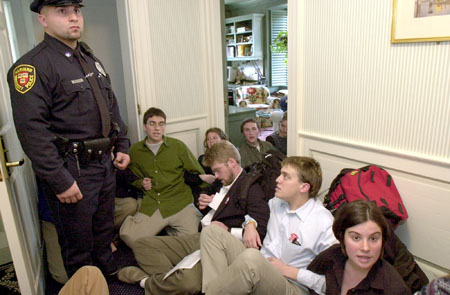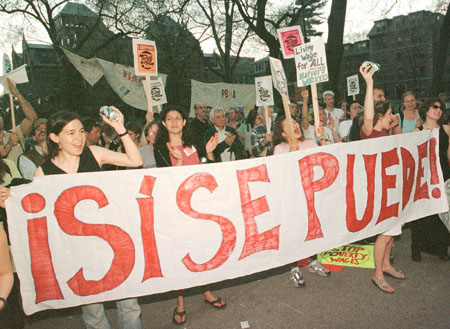Resolution sought in Mass. Hall standoff

As the Massachusetts Hall sit-in over wages for the University’s lowest-paid workers extended into its eighth day on Wednesday, protesters and members of the Harvard administration searched for a resolution to the standoff.
From the start, Progressive Student Labor Movement (PSLM) members have insisted that they would not end their sit-in unless the University agrees to pay every worker on campus – whether directly employed by the University or not – at least $10.25 an hour. They are demanding that a board consisting of PSLM members, faculty, workers, union representatives, and one administrator be created to oversee implementation of the $10.25 minimum wage.
Related information regarding the “Living Wage” campaign:
- Statement from President Rudenstine
- Facts and fallacies about employment at Harvard
- Recommendations of the faculty committee
For the latest and most comprehensive information about these issues go to http://www.provost.harvard.edu/livingwage/
The administration, on the other hand, says that the issue was studied extensively last year and that it does not intend to set compensation at the University based on a specific dollar figure. Instead, the Ad Hoc Committee on Employment Policies found that Harvard offers fair compensation and generous benefits that place it among leading employers in the region and the nation. It found, further, that low-wage workers would benefit greatly from increased education and job training. Education, particularly if offered free and during work hours, would provide workers with mobility and continue to pay benefits to the worker long after inflation had erased any one-time wage gains, the Committee said.
Rudenstine, who has had students outside both his Massachusetts Hall office and camped in the Yard outside Massachusetts Hall since April 18, issued a statement Monday reiterating the University’s position. Rudenstine also said, however, that he is open to continuing discussions on the issue once the sit-in, which he termed an attempt at “coercion … inconsistent with the fundamental principles of a university,” ends.
“The students now inside Massachusetts Hall continue to disagree with the University’s approach, and that is their right,” Rudenstine said in the statement. “It is also their right to express their views, with vigor and passion. But it is not their right to occupy a University building, to interfere with the conduct of work inside it, and to disrupt the lives of nearby student residents, in an effort to force a different decision.”
On Wednesday, Rudenstine asked J. Bryan Hehir, chair of the Executive Committee of the Faculty of Divinity, and Lowell House co-master Dorothy Austin to approach the students in an effort to explore a process that would permit a resumption of the discussion of employment practices at Harvard.
The pair first approached the students Wednesday morning and returned around 2:15 p.m. to meet with students inside Massachusetts Hall. After spending about an hour with the students Hehir and Austin departed, describing the discussion as “a good conversation” that they hoped would continue.
PSLM member Amy Offner responded to Rudenstine’s statement Tuesday, saying that it is Rudenstine, not the demonstrators, who fails to reflect University values by tolerating low wages. Offner rejected Rudenstine’s offer of a renewed dialogue, saying past discussions have had little result.
“He only agrees to meet with us to perpetuate the impression that he’s listening,” Offner said.
Choosing sides
Supporters continue to line up on both sides of the debate. Sunday night the Undergraduate Student Council voted 14-9 to condemn the protesters’ actions. The Council’s action did not address the issue of wages, rather it condemned the protesters’ tactics, which have disrupted life for students living and studying in Massachusetts Hall’s upper floors and in surrounding dormitories.
The Harvard Crimson on Friday criticized the PSLM sit-in, saying though the paper supports higher wages for Harvard workers, the action was “unjustified and ineffective.”
Student protesters, in turn, have garnered support from U.S. Sen. Edward Kennedy, D-Mass., who visited the protesters Friday. Other support has come in from former U.S. Labor Secretary Robert Reich, the Cambridge City Council, and AFL-CIO President John J. Sweeney, who issued a statement on Friday “wholeheartedly” endorsing their demands.

“Harvard University is one of the wealthiest universities in the world. … This institution can afford to make sure that the men and women who clean its classrooms, serve students food, care for its grounds and touch every aspect of daily life at Harvard can support their families in dignity,” Sweeney said. “It’s nearly impossible to do that for less than $10 an hour.”
Harvard spokesman Joe Wrinn said that the University shares the students’ goals of fair compensation and dignity for all workers, but differs on how to achieve them. Wages, he said, should be set within the collective bargaining process.
In addition, Wrinn said, the University believes it has fairly considered the issue and has embarked on a path that will lead to positive and more permanent changes for those at the low end of the pay scale through education.
The centerpiece of the University’s efforts is The Bridge to Learning and Literacy Program. The program, which grew out of a pilot program at the Harvard Faculty Club, teaches English as a second language classes and offers literacy, high school equivalency, and basic computer training.
With another expansion – to 500 participants – expected next year, the program has been praised by national labor experts, in part because it is both free and allows workers to take classes during release time from their jobs. The release time is a critical feature, they say, since classes after work are impossible for those who have multiple jobs or for working parents with child-care obligations.
While the University has moved to implement the Ad Hoc Committee’s recommendations, student protesters have rejected them out of hand. They argue that the Ad Hoc Committee lacked legitimacy because it consisted of faculty members “hand-picked” by Rudenstine. They also argue that wages are currently so low that basic needs, such as food and shelter, should be met before dealing with other issues.
“Faculty members are profoundly independent thinkers, as any administrator will attest,” Wrinn said. “The president relied on their independent analysis and expertise to give the issue a fair hearing.”
Tent City
While the administration and protesters wrangle over the merits of the issue, the sit-in continues. An uneasy truce has reigned over Massachusett Hall’s first floor and the Yard outside since 46 members of the PSLM stormed through the door on April 18.
Armed with bundles of food and pamphlets promising not to damage anything or interfere with business, the protesters pledged to stay as long as it takes to gain Harvard workers what they term a “living wage.”
Harvard police have kept a watchful eye over the building, allowing access only to House masters and staff working in the building. While access has been blocked, the flow of supplies has not. Students, whose numbers have shrunk to 36, have been allowed to receive food shipments from supporting organizations and their dining halls, as well as essentials such as prescription drugs.
“The College has expressed concern for the students in Mass. Hall as well as those outside,” said David Illingworth, associate dean of Harvard College. “Students occupying Mass. Hall have access to food and medical care and have been visited by their dean and House masters.”
Outside Massachusetts Hall, PSLM members have maintained an ongoing vigil, erecting about three dozen tents in the nearby Yard. The vigil has been anything but silent, however, with leafletting of passers-by, recruiting of supporters to the cause, and daily rallies in support of the students inside.
While making their case known, the noisy activism has triggered complaints from students living on Mass. Hall’s upper floors and in surrounding dormitories, sparking a counter-protest last week by nearby student residents. Some workers inside Mass. Hall have complained that protesters have blocked access to their offices and verbally abused them. Two workers reported they were called “Nazis” by students sitting in the building. In response, protesters have agreed to tone down their demonstrations.
Despite that pledge, Offner said the support the demonstrators have gained over the past week has made their position stronger, not weaker. With the passage of time, she believes the pressure will mount and the University will have to acquiesce to the PSLM’s demands.
“Spirits are very high. We have more food than we can eat, more speakers than we can schedule to speak,” Offner said. “I think the University has to cave, they’ve got to negotiate and it has to happen now.”
Harvard House Masters and members of the United Ministry have weighed in on the debate. Members of both groups have called for a negotiated end to the stalemate.




